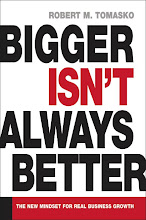April 15, 2009
Reinventing (intelligent) regulation
The Washington Post’s Steve Pearlstein wrote another on-target column today outlining the roles of the financial regulators that will be needed to keep bigger-is-better thinking from causing future financial crises. He wisely warns of dangers of creating an intelligent regulatory system in a rush, and as a reaction to the current mood of populist outrage about Wall St et al. Outrage is great for stimulating awareness of a problem, but it’s a poor basis upon which to create something new and better.
What Steve misses in his analysis is the critical role the US congress must play in any regulatory overhaul. And there’s the rub. Congress has allowed itself to fund its election campaigns through private contributions rather than through public funds. Call it government-by-the-highest bidder. As long as this is the “American way” don’t expect smart and even-handed regulation of the economy.
If you want to see something saner, support groups like Common Cause who are working hard to take the influence of money out of government. It’s an uphill struggle. Most members of Congress got there because they were good at playing the current game. Incentives are few for game-changers, and those who are elected soon learn the ways of the game players.
Link
What Steve misses in his analysis is the critical role the US congress must play in any regulatory overhaul. And there’s the rub. Congress has allowed itself to fund its election campaigns through private contributions rather than through public funds. Call it government-by-the-highest bidder. As long as this is the “American way” don’t expect smart and even-handed regulation of the economy.
If you want to see something saner, support groups like Common Cause who are working hard to take the influence of money out of government. It’s an uphill struggle. Most members of Congress got there because they were good at playing the current game. Incentives are few for game-changers, and those who are elected soon learn the ways of the game players.
Link
April 12, 2009
Growth requires subtraction as well as addition
Follow the link to a good Fortune case study about how Middlebury College (see Feb 2 '09 post) is coping with the economic downturn. There are lots of lessons for organizations - for-profit as well as non-profit - here.
... comments Ronald Ehrenberg, a Cornell University economist who studies higher education.
The article also highlights Ron Liebowitz, who came to Middlebury as a faculty member in 1984 and is now its president, concern about a financial bubble:
Link
"Especially in the private sector, higher ed has grown by adding new things without taking old things away. There's going to be a lot of soul-searching on campuses around the country, and colleges asking, 'What's essential?"
... comments Ronald Ehrenberg, a Cornell University economist who studies higher education.
The article also highlights Ron Liebowitz, who came to Middlebury as a faculty member in 1984 and is now its president, concern about a financial bubble:
"He watched the college's amazing growth with a mixture of awe and concern. 'I'd always thought the entire business model of higher education was a little suspect,' he says, 'especially for residential liberal arts colleges like Middlebury, because of what it assumes in terms of large endowment returns, large gifts from alumni, and tuition increases that go beyond inflation.' "
Link
